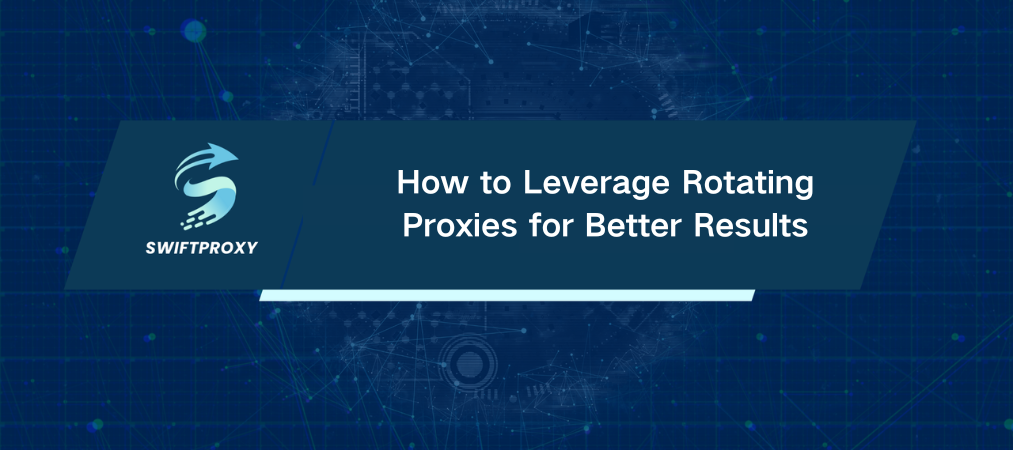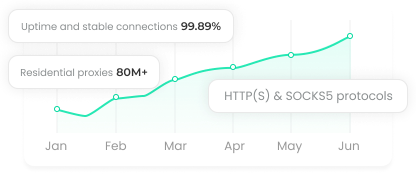How to Leverage Rotating Proxies for Better Results

Imagine making hundreds or thousands of web requests without ever getting blocked or flagged. Sounds like a superpower, right? That's exactly what rotating proxies deliver. By automatically switching your IP address with every request or at set intervals, rotating proxies keep you invisible online. Whether you're scraping data, managing multiple accounts, or bypassing geo-restrictions, they're game changers.
But not all proxies are created equal. This post dives deep into what rotating proxies are, why they matter, and how to choose and use them effectively—without wasting money or risking your projects.
What Is a Rotating Proxy
Think of a rotating proxy as your online disguise that changes constantly. Instead of sticking to a single IP address, it cycles through a large pool of IPs. This makes it nearly impossible for websites to detect and block your activity.
Here's the breakdown:
Dynamic IPs: Each request or defined time period triggers a new IP.
Huge IP Pools: Hundreds or thousands of IPs ready to rotate at your command.
Flexible Rotation Modes: Change IP per request or automatically every few minutes—your choice.
Why does this matter? Because one static IP is easy to spot and block. Rotating proxies blend your activity across many IPs, so you stay under the radar.
Different Types of Rotating Proxies
Rotating proxies come in several flavors, each suited for different tasks. Understanding their strengths helps you pick the right one.
Residential Rotating Proxies
These IPs come from real home internet users. They're the most trusted by websites because they look like normal traffic.
Payment: Usually charged by data usage (GB), not just IP count.
Geotargeting: Pinpoint exact locations—even down to city and ISP.
Speed & Stability: Generally fast and stable, though occasional short IP disconnections happen.
Cost: Pricier than others, but worth it for stealth and reliability.
Detection Risk: Nearly zero; they're almost indistinguishable from real users.
Ideal for sensitive scraping, analytics, and projects where trust matters most.
Mobile Rotating Proxies
These IPs come from real mobile devices connected via cellular networks.
Rotation: Change IP by request or timed intervals.
Massive Pools: Thousands of mobile IPs available.
Privacy: High anonymity due to real mobile IPs.
Detection: Harder for websites to block because mobile IPs are “real users.”
Cost & Speed: Generally more expensive; speed varies by provider and region.
Perfect for social media management, ad campaigns, or any task demanding top-tier privacy.
Datacenter Rotating Proxies (Sort Of)
Technically, datacenter proxies don't rotate IPs themselves. They're fast and cheap but less trusted because they come from servers, not real users.
Rotation via Software: You can script IP changes, but these are artificial rotations.
Speed & Cost: Lightning fast and very affordable.
Risk: Easier to detect and block.
Use Cases: Ideal for testing, quick scraping where privacy isn't critical.
If you're on a budget and speed is king, datacenter proxies with scheduled rotation might suffice.
How to Use Rotating Proxies Effectively
Rotation alone isn't enough. To get real value, tailor your approach to your task:
Marketing Automation: Use mobile proxies to avoid ad platform bans during campaign scaling.
Data Scraping: Residential proxies mimic real users, avoiding CAPTCHAs and blocks.
Multi-account Management: Rotate IPs for seamless profile creation and operation on social networks and marketplaces.
Bypass Geo-Blocks: Choose proxies with precise geo-targeting to access location-locked content effortlessly.
Always define your needs upfront: number of IPs, rotation frequency, budget constraints, and required anonymity.
The Pros and Cons of Rotating Proxies
Pros:
Enhanced Security: Constant IP changes reduce tracking and blocking.
Uninterrupted Access: Bypass limits, CAPTCHAs, and geo-restrictions.
Scalability: Manage multiple accounts or scrape huge datasets without headaches.
Cons:
Cost: Premium rotating proxies (mobile and residential) come at a price.
Setup Complexity: Requires proper configuration with scraping tools, DNS, or marketing platforms.
Potential Delays: IP switching can cause minor lags or connection hiccups.
They're powerful but need thoughtful integration.
Alternatives to Rotating Proxies
If proxies feel complex, consider these:
Tor: Exceptional anonymity through multiple encrypted hops, but slow and unreliable for heavy automation.
SSH Tunneling: Secure, private, but technically demanding and limited in IP options.
Each has pros and cons depending on your skill level and project needs.
Final Thoughts
Rotating proxies are more than just tools—they're strategic assets that, when used wisely, provide anonymity, power, and flexibility for scraping, marketing, and digital operations. Choosing between mobile or residential proxies for stealth and trust, or datacenter proxies for speed and cost-efficiency, requires careful configuration aligned with your goals. Mastering their use means you're not just browsing the web—you're controlling it.
關於作者

Imagine making hundreds or thousands of web requests without ever getting blocked or flagged. Sounds like a superpower, right? That's exactly what rotating proxies deliver. By automatically switching your IP address with every request or at set intervals, rotating proxies keep you invisible online. Whether you're scraping data, managing multiple accounts, or bypassing geo-restrictions, they're game changers.
But not all proxies are created equal. This post dives deep into what rotating proxies are, why they matter, and how to choose and use them effectively—without wasting money or risking your projects.
What Is a Rotating Proxy
Think of a rotating proxy as your online disguise that changes constantly. Instead of sticking to a single IP address, it cycles through a large pool of IPs. This makes it nearly impossible for websites to detect and block your activity.
Here's the breakdown:
Dynamic IPs: Each request or defined time period triggers a new IP.
Huge IP Pools: Hundreds or thousands of IPs ready to rotate at your command.
Flexible Rotation Modes: Change IP per request or automatically every few minutes—your choice.
Why does this matter? Because one static IP is easy to spot and block. Rotating proxies blend your activity across many IPs, so you stay under the radar.
Different Types of Rotating Proxies
Rotating proxies come in several flavors, each suited for different tasks. Understanding their strengths helps you pick the right one.
Residential Rotating Proxies
These IPs come from real home internet users. They're the most trusted by websites because they look like normal traffic.
Payment: Usually charged by data usage (GB), not just IP count.
Geotargeting: Pinpoint exact locations—even down to city and ISP.
Speed & Stability: Generally fast and stable, though occasional short IP disconnections happen.
Cost: Pricier than others, but worth it for stealth and reliability.
Detection Risk: Nearly zero; they're almost indistinguishable from real users.
Ideal for sensitive scraping, analytics, and projects where trust matters most.
Mobile Rotating Proxies
These IPs come from real mobile devices connected via cellular networks.
Rotation: Change IP by request or timed intervals.
Massive Pools: Thousands of mobile IPs available.
Privacy: High anonymity due to real mobile IPs.
Detection: Harder for websites to block because mobile IPs are “real users.”
Cost & Speed: Generally more expensive; speed varies by provider and region.
Perfect for social media management, ad campaigns, or any task demanding top-tier privacy.
Datacenter Rotating Proxies (Sort Of)
Technically, datacenter proxies don't rotate IPs themselves. They're fast and cheap but less trusted because they come from servers, not real users.
Rotation via Software: You can script IP changes, but these are artificial rotations.
Speed & Cost: Lightning fast and very affordable.
Risk: Easier to detect and block.
Use Cases: Ideal for testing, quick scraping where privacy isn't critical.
If you're on a budget and speed is king, datacenter proxies with scheduled rotation might suffice.
How to Use Rotating Proxies Effectively
Rotation alone isn't enough. To get real value, tailor your approach to your task:
Marketing Automation: Use mobile proxies to avoid ad platform bans during campaign scaling.
Data Scraping: Residential proxies mimic real users, avoiding CAPTCHAs and blocks.
Multi-account Management: Rotate IPs for seamless profile creation and operation on social networks and marketplaces.
Bypass Geo-Blocks: Choose proxies with precise geo-targeting to access location-locked content effortlessly.
Always define your needs upfront: number of IPs, rotation frequency, budget constraints, and required anonymity.
The Pros and Cons of Rotating Proxies
Pros:
Enhanced Security: Constant IP changes reduce tracking and blocking.
Uninterrupted Access: Bypass limits, CAPTCHAs, and geo-restrictions.
Scalability: Manage multiple accounts or scrape huge datasets without headaches.
Cons:
Cost: Premium rotating proxies (mobile and residential) come at a price.
Setup Complexity: Requires proper configuration with scraping tools, DNS, or marketing platforms.
Potential Delays: IP switching can cause minor lags or connection hiccups.
They're powerful but need thoughtful integration.
Alternatives to Rotating Proxies
If proxies feel complex, consider these:
Tor: Exceptional anonymity through multiple encrypted hops, but slow and unreliable for heavy automation.
SSH Tunneling: Secure, private, but technically demanding and limited in IP options.
Each has pros and cons depending on your skill level and project needs.
Final Thoughts
Rotating proxies are more than just tools—they're strategic assets that, when used wisely, provide anonymity, power, and flexibility for scraping, marketing, and digital operations. Choosing between mobile or residential proxies for stealth and trust, or datacenter proxies for speed and cost-efficiency, requires careful configuration aligned with your goals. Mastering their use means you're not just browsing the web—you're controlling it.


















































